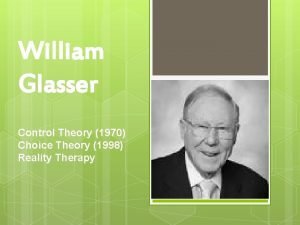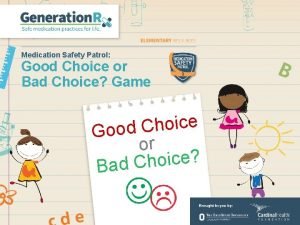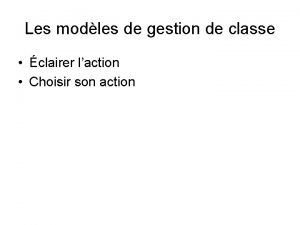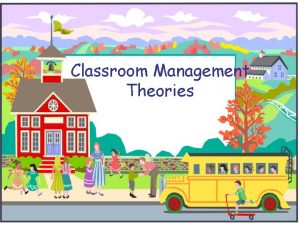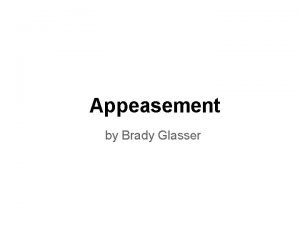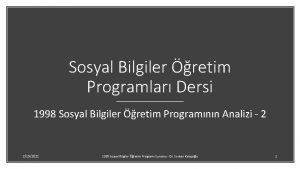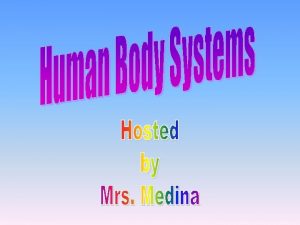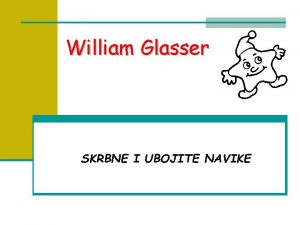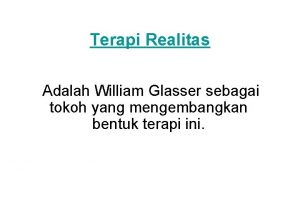William Glasser Control Theory 1970 Choice Theory 1998













- Slides: 13

William Glasser Control Theory (1970) Choice Theory (1998) Reality Therapy

William Glasser- choice theory https: //www. youtube. com/watch? v=y. ZA 0 z. Ag. Ol 60 Glasser interview

5 Basic Needs of Choice Theory Survival: Physiological needs (eating, drinking, etc. ), stay alive and reproduce Non-Survival: To belong (to love, to share and to cooperate) To gain power (uniquely human) To be free To have fun Very early, Dr. Glasser came to the conclusion that genetically we are social creatures and need each other and that the cause of almost all psychological symptoms is our inability to get along with the important people in our lives.

Reality Therapy: Basic Process Existence- here & now Control/Choice theory Rejection of medical model - no labeling Success identity and positive addiction successful picture album Emphasis on responsibility/choice de-emphasis on exploration of past or unconscious de-emphasis on transference/working through with therapist

Reality Therapy – Basic Process Friendly environment Enhance relationship Explore total behavior Doing, thinking, feeling and physiology Evaluate behavior Clients make value judgments about their behavior; counselors ask value questions Make plans to DO better Specific plans to meet needs Commitment to plans Plans must be feasible; consider a contract https: //www. youtube. com/watch? v=m. ZWGz. WPqja 0&index=1&list=PLF 6483219 B 912 D 418

Glasser’s concept of Total Behavior

Assessment in Reality Therapy Ask client what they want, to determine Doing Thinking Feeling Physiology Listen for choices that client makes Assess how client needs are being met

Therapist Role Develop a relationship with client Warm Genuine nonjudgmental Function as a teacher by being active, co relationship Helping clients develop plan, directive Offering behavioral choices and guidance Confronting and demanding

Eight Steps to Reality Therapy- Glasser (1965) 1. Create a relationship 2. Focus on current behavior 3. Invite client to evaluate behavior 4. Help clients develop an action plan 5. Get commitment of plan 6. Refuse to accept excuses 7. Refuse to use punishment 8. Refuse to give up on client

Common Reality Therapy Strategies description Questioning Explore “total behavior”, evaluating what client is “doing” and making specific “plans” Being positive Focus on what the client CAN do! Metaphors Using the clients language Humor Fits nicely with friendly environment Confrontation Do not give up on client or criticize the client and do not accept excuses from client Paradoxical techniques Reframing (seeing a behavior that was previously undesirable as desirable) and prescription (instructing client to choose a symptom ) Ex: a client who is afraid of making mistakes at work may be encouraged to make a mistake. If the client tries to make a mistake, then the client shows control over the problem.

Applications Individual counseling Marriage counseling Family counseling Group counseling Social work Education and teaching Crisis intervention Corrections and rehabilitation

Reality Therapy One final note on therapy…… Two and a Half Men- Charlie in therapy

Class Exercise Good Will Hunting Failed Therapists Super. Philosophy Park Scene What Do You Want To Do? When Did You Know? It's Not Your Fault
 Glasser 5 basic needs
Glasser 5 basic needs William glasser control theory
William glasser control theory Good choice or bad choice
Good choice or bad choice Perry glasser
Perry glasser Modèle de glasser
Modèle de glasser Glasser's basic needs
Glasser's basic needs Kounin model of discipline
Kounin model of discipline Modelli di gestione della classe glasser
Modelli di gestione della classe glasser Brady glasser
Brady glasser Sami2c3
Sami2c3 Alexandra glasser
Alexandra glasser 261659
261659 1998 sosyal bilgiler öğretim programı
1998 sosyal bilgiler öğretim programı Sabah water resources enactment 1998
Sabah water resources enactment 1998
